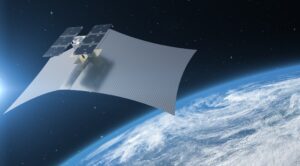Capella joins SpaceNet, shares first radar data with consortium

SAN FRANCISCO – Capella Space, a startup building a constellation of synthetic aperture radar (SAR) satellites, is joining SpaceNet, a nonprofit focused on geospatial applications for artificial intelligence.
Since SpaceNet was established in 2016 by CosmiQ Works, the In-Q-Tel organization focused on commercial space, it has provided free high-resolution electro-optical satellite imagery, advertised challenges and awarded cash prizes to encourage people to test and refine image analysis tools.
SpaceNet has helped expand geospatial research and applications for electro-optical satellite imagery, said Ryan Lewis, SpaceNet general manager and senior vice president at In-Q-Tel, the venture capital arm of U.S. intelligence agencies. “Looking ahead, we want to see the same occur not just for imagery but also for SAR data,” he told SpaceNews.
For Capella, joining SpaceNet is a good way “to get SAR data into the hands of a broader range of data scientists and software engineers,” said Scott Soenen, Capella product engineering vice president. “This is the first step in our engagement with the broader community. Having data out there under an open license is going to foster the development of nontraditional applications for SAR data.”
Capella has raised more than $50 million for a constellation of 36 SAR satellites designed to capture imagery with a resolution of 50 centimeters and revisit sites hourly. Capella launched its first satellite in December 2018. The company has not publicly released data from that spacecraft. Capella plans to launch its first operational spacecraft, Sequoia, in early 2020.
Capella also is capturing imagery with its SAR payload on an aircraft.
“We’ve collected aerial data and produced it according to our product specifications for our upcoming satellite data,” Soenen said. “We will have a high resolution, hourly dataset to contribute to the SpaceNet challenges in advance of the routine operations of Sequoia.”
While some people perceive SAR data to be more difficult to work with than electro-optical imagery, one of the datasets it provides is so similar that some of the same computer vision tools will work on electro-optical and SAR data, Soenen said. SAR satellites also gather imagery and data through clouds, smoke and at night.
“At Capella, we want to break down those barriers to entry in working with SAR and make sure that we’re providing products that are easy to work with,” Soenen said. “Working with partners like CosmiQ Works and the SpaceNet team, we will make sure that there’s a good array of open source tools that can easily plug and play with our dataset,” Soenen said.
For SpaceNet’s fifth and most recent challenge, competitors are automatically identifying roads and determining optimal routes based on travel times by applying artificial intelligence to satellite imagery. Since the first challenge in 2016, “we have seen the community grow over time in the maturity of their solutions,” Lewis said. “That’s why we think it’s an optimal time to be focusing on how to incorporate SAR into a future challenge.”
Before Capella joined, SpaceNet partners were CosmiQ Works, Maxar Technologies, Intel AI and Amazon Web Services.
“The partners have collectively agreed that geospatial mapping challenges are rarely resolved with just one type of data,” Lewis said. “While we’ve seen tremendous improvement in the models that we’ve open-sourced through our internal research as well as through our challenges, we’re now ready and the open-source communities is ready to tackle the next step, which is applying two different types of data simultaneously to solve one problem. We couldn’t be more excited to explore what it’s like to combine both electro-optical and SAR to solve a foundational mapping problem.”
SpaceNet may incorporate SAR in its sixth challenge scheduled to begin in early 2020, Lewis said.
In the past, high resolution SAR data was largely reserved for government and defense applications, Andrew Ulmer, Capella business development vice president, said in an Aug. 21 statement announcing the firm’s participation in SpaceNet. “By opening access to this type of data and lowering barriers to adoption, we aim to foster broad and rapid advances in commerce, conservation and well-being across many industries. We encourage industry leaders, academics and nongovernmental organizations to experiment with the data, as it’s our collective imagination that will unlock the most value and transform how we live.”
from SpaceNews.com https://ift.tt/2MJzQCx
Comments
Post a Comment